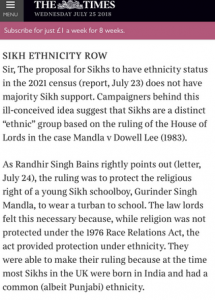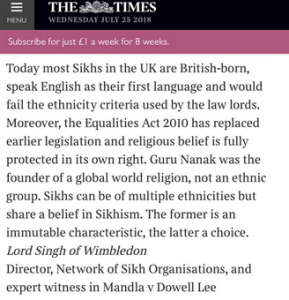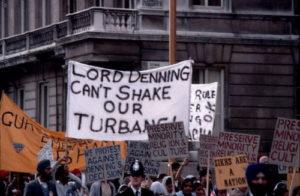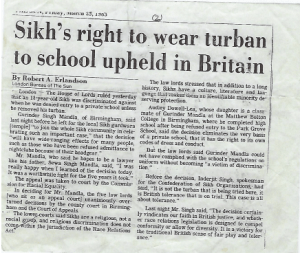
article from archive following Mandla in 1983
Difficulties
Supposed support by MPs and the APPG for British Sikhs
Speaking to a number of MPs, including some of those who have given support to the Sikh ethnic tick box, confirms that few have any understanding of Sikh teachings against artificial and divisive groupings of our one human race; nor were they clear of the supposed benefits of describing Sikhs as an ethnic group. Those who signed did so because they were told that this is what their Sikh constituents wanted.
Supposed support in the Sikh Community
Gurdwaras are generally unaware of the pros and cons of ethnic monitoring. Some, that have voiced support for a Sikh ethnic tick box, say they did so because they are stridently opposed to the alternative of describing themselves as ‘Indian’, because of still lingering anger over the state-sponsored genocide against Sikhs in 1984. Many others are of the view that calling ourselves an ethnic group as opposed to Indian is a step towards creating distinct ‘quam’ (national) identity and the creation of a separate Sikh State in India.
While the emotive appeal is very real, it has nothing to do with the 2021 census. It also ignores basic Sikh teachings on the absurdity of creating artificial divisions in our one human family – particularly in the pursuit of supposed material gain. It should also be remembered that some of the organisations lobbying for support for a Sikh ethnic tick box, like the Sikh Federation UK, and the Sikh Network, etc, are all run by the same small group of people, who also have a dominant voice in the Sikh Council.
Reality of support in the Sikh community
The overwhelming attitude of most gurdwaras to a Sikh ethnic tick box in the census is a lack of understanding and relevance. If told that that a Sikh ethnic tick box will benefit the ‘quam’ (Sikh nation), they will probably quickly sign support and get back, to what they regard as, the more important business of providing a service to their sangat (congregation). If however, the real pros and cons are explained and discussed, interest is more sustained, and attitudes are often quite different.
At the suggestion of ONS officers, a meeting was arranged in Guru Singh Sabha Gurdwara Hounslow, with a representative of the ONS present. Presentations were made by the NSO and the Sikh Federation UK and, after discussion for more than an hour, the proposal for a Sikh ethnic tick box in the next census was totally rejected by members of the Gurdwara Committee.
The Sikh ethnic tick box proposal has also been totally rejected in other gurdwaras, where both the pros and cons have been explained and discussed by Committee members, most recently at the gurdwara in Edinburgh.
Suggestion
The only real way to assess whether Sikhs in the UK are prepared to over-ride essential Sikh teachings for unquantified material gain, is by open public debate monitored, and perhaps presided over, by the ONS. Unfortunately, this repeated suggestion by the NSO has been met with personal abuse from the Sikh Federation UK in its different guises.
My repeated request to be allowed to address the APPG for British Sikhs (from which I and other Sikhs in Parliament have been excluded) has also been consistently ignored, as has my request for open debate on any London Sikh TV Channel, Why? My hope is that we show that we are mature enough to discuss such issues rationally and respectfully, always bearing Sikh teachings in mind.
Lord (Indarjit) Singh of Wimbledon, Director Network of Sikh Organisations (NSO)


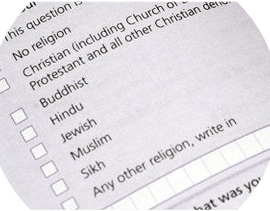 As many will know we have strenuously opposed the Sikh Federation UK’s (SFUK) ill conceived campaign to classify ‘Sikh’ as an ethnicity for many years.
As many will know we have strenuously opposed the Sikh Federation UK’s (SFUK) ill conceived campaign to classify ‘Sikh’ as an ethnicity for many years.